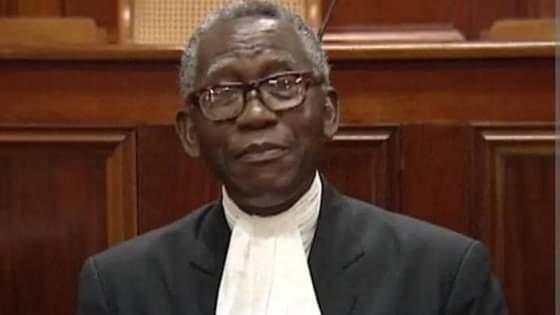Land, the environment and elections
Why natural resource governance should take centre stage in Sierra Leone’s 2018 elections
The ancient ford truck belched black smoke on the highway as it laboured with its heavy load towards Freetown. Chunks of rough-hewn tree trunks overflowed its wagon. A dirty, red cloth hammered into one of the over-hanging pieces dangled in the wind- some sort of warning to other motorists not to get too close. The cargo is destined for some foreign city. (Photo: Sonkita Conteh, author)
In a country with less than 5% original forest cover remaining, it should be scandalous that logging still happens on a grand scale. But government has been decidedly indecisive. There was a timber export ban that wasn’t really a ban because it allowed exemptions. Now there isn’t a ban in place and timber traders are in a hurry to shave off the last remaining patches of ancient forests. For them, there is no guarantee that things will remain the same after the March 7th elections.
The Chinese are at the forefront of the timber trade, carting away thousands of pieces of prized wood that took dozens of years to mature. And then there are the “power-saw poachers” who service the local market. They succeed in worming their way into even protected forests and wreak havoc on nature. As forests disappear so do millions of flora and fauna. We are not just losing trees- we are being robbed of a biological civilisation built over thousands of years.
Sugarland is a small settlement on the coast of Freetown- a blight along what is regarded as one of the most beautiful stretches of beach real estate. It has been ravaged by sand mining, a victim of the construction boom in Freetown. Now, it is at the mercy of the elements. Having lost its sandy buffer, chunks of land weakened by the waves, fall into the sea. Other coastal settlements like John Obey and Hamilton are becoming like Sugarland- stripped bare by a combination of greed and zero enforcement of regulations. Only a matter of time before land gives way to the sea. Good examples of environmental stewardship along the coast, such as the one found at the No.2 River beach settlement, are few and under threat.
The desire for short term gain is overriding the imperative for long term stewardship. And everyone is guilty of this- government, communities, corporations and individuals. The arrogance that we can simply just keep taking from nature’s seemingly endless supply of good things will be the death of our nation. This conceit is manifested in investment decisions at the highest level and in individual attitudes towards waste disposal. Plastic has become the new menace- clogging gutters and waterways and contributing to flooding.
A fortnight ago, I helped three communities in the north file class action cases against the biggest ore miner in the country for among others, pollution of swamplands and streams. Assisted by paralegals, the villages couldn’t get redress from the country’s mines and environment regulators. They are now pinning their hopes on the judiciary. The ore is found in a 227 square kilometre mountain range under which sit many villages. By the end of the company’s 25 year mining lease, the mountain would have been levelled and the villages smothered by ore sludge and tailings. For these communities, it is a matter of life or death.
Decisions to allow investments into the country or enforce environmental regulations are now largely political. This is why the forthcoming multi-tier elections are crucial. Could aspiring candidates, hungry for votes, be persuaded to make some major commitments to the electorates such as a pledge to protect the environment robustly or seek consent from affected communities before approving mining or other large-scale land investments?
Over 4000 citizens from every district and including paramount chiefs, scientists, lawyers, journalists, entrepreneurs and religious leaders are hoping to do just that. This group has asked political parties and their candidates to endorse the “Wi Land Na Wi Fyuchɔ” pledge,[1] a set of commitments to among others, respect tenure rights, reform natural resource management and protect the environment by enforcing regulations dispassionately. Twelve non-governmental organisations including the Network Movement for Justice and Development, Action for Large-Scale Land Acquisition Transparency, University of Makeni and Namati[2] have also endorsed the pledge.
Since independence, the approach of successive governments to the prevalence of natural resources in our country has been to exploit without restraint. This can no longer continue. Our patch of the earth has been routinely abused and is now showing it. The landslide in Freetown last August, which claimed the lives of over a thousand people, is one example of nature buckling under the strain of our relentless misuse. The bad news is that land slide, flooding and other forms of natural disasters could happen anywhere in the country and at any time. This is how bleak our future is.
So is it possible to turn things around? There is a fighting chance and it would require a genuine commitment to do things differently. This commitment is called political will- the determination to enforce rules to protect the environment and rein in recalcitrant corporations; the determination to give communities a role in the management of their land and natural resources; the determination to reject certain types of investments which are deleterious to our land and environment; the determination to be transparent about investment decisions; and the determination to reject corruption in all its forms and entrench accountability in the management of natural resources and in governance as a whole. Sierra Leone has endured a debilitating civil war and the worst outbreak of the Ebola epidemic in history. But environmental degradation might well be the harshest trial yet for a tough but weary nation.
It should therefore be the responsibility of every voter to demand assurances from political parties and their candidates at all levels, that they will make the protection of our land and environment a priority, if they win power. The future is at stake and it is worth fighting for. But everyone needs to be involved in the fight to save the “land that we love”.
By Sonkita Conteh, Director, Namati Sierra Leone
Stay with Sierra Express Media, for your trusted place in news!
[1] “Our Land Our Future: A Pledge,” https://ourlandourfuture.com.
[2] Namati Sierra Leone worked on this pledge without the involvement of its international counterpart, using revenue Namati Sierra Leone generated independently.
© 2018, https:. All rights reserved.






